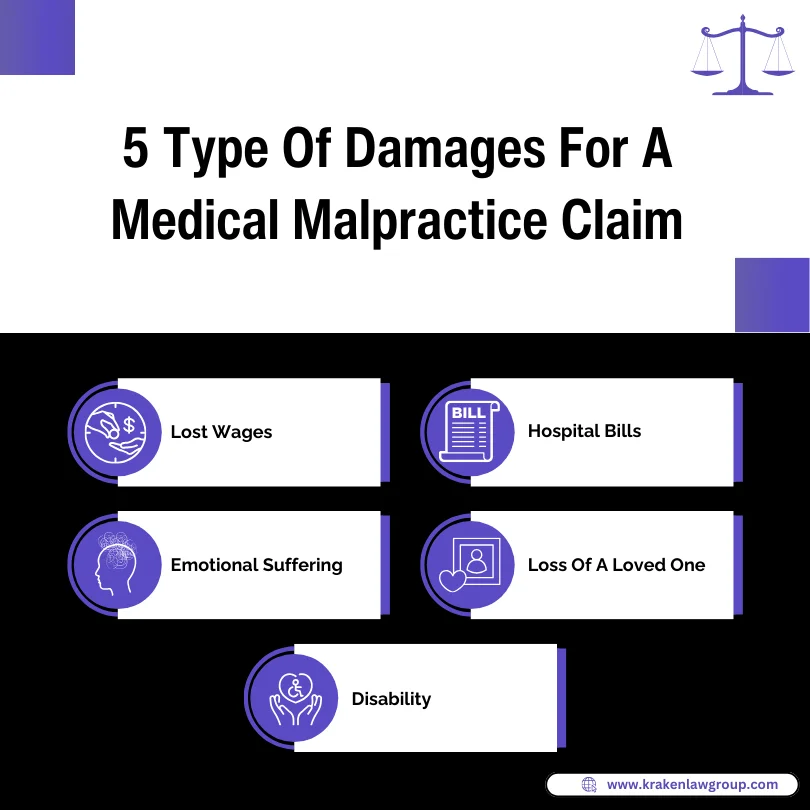Mistakes in the medical sector are not affordable, which is why malpractice claims don’t occur frequently. However, unfortunate incidents can happen in different situations.
If you don’t have good experience with healthcare personnel in Florida, you may be wondering about medical malpractice claims. These lawsuits can be helpful in various incidents.
Fortunately, you don’t have to search any further to learn about malpractice in Florida. Below we have detailed everything you must know.
What Is Considered Medical Malpractice In Florida?

Medical malpractice claims in Florida are those in which medical personnel have hurt someone. For example, a doctor may make a mistake during a surgery leaving the patient with a permanent disability.
Similarly, poor care by nurses in different institutes may lead to injury or mental health deterioration. Regardless of the cause, a common feature of all medical malpractice claims is that the case is against someone in the healthcare field.
Let’s look at the things that come under medical malpractice in Florida:
- Delay in making a diagnosis
- Misdiagnosis
- Taking incorrect patient history
- Failing to offer proper aftercare
- Minor to major surgical errors
- Lack of lab reports or misinterpreting results
- Prescribing incorrect dose or overall medication
- Unnecessary surgeries
If a doctor or hospital personnel make earlier mentioned mistakes, they may be liable under medical malpractice claims.
Exceptions To The Medical Malpractice Statute Of Limitations
The statute of limitations for medical malpractice claims in Florida is two years after the incident. In this short span, you must decide whether you want to file a case to seek compensation.
If you exceed the medical malpractice statute of limitations, you cannot file a claim for that case. This is regardless of your damages. However, there are some exceptions to this limit.
For example, the medical malpractice statute of limitations can be enhanced to four years from the incident date under the repose statute. Even with the limit increase, you will still have to file a case within two years of being aware of the incident.
So if you become aware of the medical malpractice one year after the incident, you will have two years to file a case after that. This means that you would be starting a claim three years after the incident overall.
Another exception to the limit is if the malpractice was purposely concealed from you. In such cases, you will have two years after discovery to file a claim. You will also have overall seven years from the day of malpractice to start a case.
What Type Of Damages Can You Seek For A Medical Malpractice Claim?

Overall, there are two categories of damages for seeking compensation. You can file medical malpractice claims to recover from economic damages such as lost wages.
Meanwhile, non-economic damages help you seek compensation for intangible suffering. For example, you may have been in pain due to the malpractice.
So you can file medical malpractice cases to get compensation for your suffering and inconvenience.
Let’s understand the specific damages you can seek compensation for by filing medical malpractice claims:
1. Lost Wages
There are different ways you can end up losing wages due to medical malpractice cases. The doctor may have injured you directly causing you to be at bed rest. This means you would lose out on your weekly or monthly wages.
Besides that, the breadwinner of your family may have been hurt due to medical malpractice cases. So you can file a claim on their behalf to recover from their lost wages by seeking compensation.
If your ability to work is affected in any way, you can file for medical malpractice in Florida. You may also lose partial wages because of being able to work only a few hours a day instead of your full-time job.
A lawyer can help you understand different scenarios of lost wages due to medical malpractice claims. They can also help you decide whether you are eligible to receive compensation.
Remember not every case of prolonged bed rest after a surgery or another procedure is due to medical error. Sometimes your condition may be the sole cause.
2. Hospital Bills
Going to a hospital for surgery, a simple procedure, or a checkup will cost you financially. You will have to pay for the overall bill and get medicines prescribed by the doctor. In a medical malpractice case, you may have to be admitted to a hospital for a prolonged period.
A surgical mistake may also cause you to get another operation to fix the first error. All these things will cause you to suffer from mental stress and overwhelming bills. That is where medical malpractice claims will come to help you.
By filing a case, you can seek compensation for the unnecessary hospital bills you have to pay because of one error. An attorney will help you determine the worth of your claim through different calculations.
You will always have to consider three types of bills for accurate compensation:
- Any past medical bills that you paid before discovering the medical malpractice
- Present healthcare bills
- Future medical bills for problems that may arise because of the initial malpractice in Florida
3. Emotional Suffering
Many people believe that they can only start medical malpractice claims if they suffer a physical or tangible injury. However, that is not true. Intangible damages are also eligible for compensation.
In fact, Florida does not have any limit on the type of damages you can seek compensation for under medical malpractice claims. The error may cause you to suffer emotionally in various ways such as:
- Depression
- Anxiety
- PTSD of going to hospitals
- Paranoia
Sometimes the emotional trauma may be so severe that you may have to go to a therapist. A lawyer for medical malpractice claims considers all these things to offer you sound advice.
They also understand your suffering to determine an accurate value of compensation for your recovery.
4. Loss Of A Loved One
No amount of money can compare to the loss of a loved one, but in some cases that is all you can get along with punishment for the culprit. Major medical malpractice cases can cause you to lose a loved one.
You can file a claim against the relevant doctor or team to get justice for the loved one. Financial compensation can also be helpful in cases where the person who passed away was the family breadwinner.
Proving negligence and medical error through solid evidence would be your top priority. This is why hiring an expert lawyer will be necessary to win the case.
This type of damage can come under non-economic and economic damages, depending on the case.
5. Disability
There have been many cases of disability in the past due to medical malpractice. A surgeon may cut a wrong nerve during a routine procedure, which can leave you with partial or complete body paralysis.
This will cause you to lose your earning potential and change your lifestyle completely. You can file a case under this category to seek compensation for the loss of quality of your life.
Medical malpractice claims for disability mainly come under non-economic damages. Recovering from hospital bills may also become difficult due to the loss of your working ability.
You may also have to hire a primary caregiver if you don’t have family that can care for you. The compensation should help you cover the salary payments of the caregiver and your other expenses.
How To File Medical Malpractice Claims In Florida?

Here are the steps you must follow when filing medical malpractice claims in Florida:
Step 1: Meet The Requirements To File A Medical Malpractice Claim
A few requirements must be met before you can start proceedings for medical malpractice claims. The two primary elements of such cases are negligence and breach of duty.
When filing for negligence, you will have to prove that the medical provider does not meet the standards of healthcare. For example, they may not have proper equipment or staff in their hospital to offer you proper aftercare after a procedure.
Meanwhile, breach of duty means the medical provider failed to meet their professional duties. If you lose a loved one because a doctor came late to attend to the patient, you can start a medical malpractice lawsuit.
It will also be essential to prove the link between the injury you suffered and the neglect by the doctor or nurse. You must also perform an investigation to prove the grounds of your claim.
This means that you must have an expert opinion that your case falls under a medical malpractice claim. Notifying the defendant at least 90 days before filing the suit is also necessary.
The statute of limitations will come to a pause during these 90 days. Within this duration, the defendant will have to give you a response. If they fail to do that or refuse to accept liability, you can hire a lawyer and move forward with legal proceedings.
Step 2: Hire A Personal Injury Lawyer To File On Your Behalf
Medical malpractice claims are serious lawsuits that you cannot fight alone. It is important to have the right support during such cases to have a substantial winning chance. That is why hiring a personal injury lawyer is necessary.
You can ask your loved ones if they have gotten into accidents such as slip and fall incidents. They may have hired a personal injury lawyer for the accident, so you can receive a reliable recommendation.
Searching online for personal injury lawyers can also help you encounter a reliable one. For example, Kraken Law is a household name in Florida that has lawyers for different types of claims.
When hiring a lawyer, ensure they have prior experience in fighting medical malpractice suits. Understanding their success rate will also help you make an informed decision.
A lawyer with more than five years of expertise and a high winning rate is the best choice for medical malpractice cases. You could also set up consultation visits with different attorneys to determine which one will be best for you.
Step 3: The Attorney Will Investigate The Claim And Gather Evidence
Sometimes you may believe a medical error has been made, but the evidence may point otherwise. This is especially true in cases of loss of a loved one. Your emotional suffering may cause you to make ill-advised decisions.
This is why the law has made prior investigation necessary for all medical malpractice claims. Your lawyer will interview hospital staff, witnesses, and the defendant to understand the case better.
Their primary aim will be to collect substantial evidence legally to submit in court. You may have done a personal investigation and recorded the professional admitting liability. However, such evidence is not admissible in court due to legality issues.
That is why hiring a lawyer is a better decision. The attorney may also bring an external medical expert for an opinion on the case. This may help you prove that the injury you suffered from or are still facing is due to a medical error.
Your lawyer will also prepare you for depositions and meetings with the defendant. Filing of proper legal paperwork will also be done by them to relieve your burden.
If any aspect of the investigation is found to be illegal, the court can dismiss your claim without proceeding further. This is why systemically gathering evidence is important for all medical malpractice claims.
Step 4: Meet The Deadline To File The Medical Negligence Claim
Medical malpractice statute of limitations is one of the deadlines you will have to meet. There are also other time limits that you must adhere to for proper legal proceedings.
Your lawyer will have to file your case in court within two years or seven years of you discovering the malpractice. The exact time will depend on the scenario of your case.
When you send a notification to the defendant, they may send you a response by presenting an offer. In such a case, you will have 50 days to accept or reject the settlement.
If you don’t respond to the defendant, they may have grounds to get the case dismissed on improper proceedings. So meet the deadline of 50 days using the advice of your lawyer.
The case will not go to court if you accept the initial offer. Your lawyer will prepare proper paperwork such as a settlement agreement. If you reject the offer due to a lowball amount or other reasons, your attorney will file different paperwork.
Your lawyer may prepare a counteroffer to get you the deserving amount in response. If all negotiations fail, the case will go to court.
Step 5: Receive Compensation For The Medical Malpractice Claim
The final step of filing medical malpractice claims is receiving the settlement amount. You can get the payment within weeks or years of filing the case. This will depend on the length of the legal proceedings.
If the defendant accepts liability on receiving notification and offers a worthy settlement, the case will end within a few days to months. However, it can take years if you go to trial because proving everything will take time.
Once you win the case, it will usually take a few days for the check to reach you. However, some companies may try to delay the payout using different tactics. An expert attorney will be aware of these tactics and will obtain the check more easily.
Typically, the insurance adjusters will give a check to your lawyer. The attorney will process that check and may subtract funds such as their legal fees from the total amount.
A lawyer will mainly deduct:
- Their legal fees
- Paperwork filing charges
- Expert fees
- Bills of copying records
You will then receive access to the remaining compensation that will help you with your recovery.
What Is The Average Medical Malpractice Settlement In Florida?

The average amount received for malpractice cases in Florida was over $300,000 in 2022. However, this does not mean you will receive the same settlement.
Every case is different, which is why there is no fixed way of determining a reliable average payout. The depth of your injuries may be severe and require long-term treatment.
This means you may even get a settlement amounting to $1 million or more. Of course, such high compensation value is rare and quite difficult to receive.
The overall factors that affect the payout amount for medical malpractice claims include:
- Extent of the injuries
- Plaintiff’s age
- All past and present medical expenses
- Permanent or temporary disability
- The possibility of future medical bills
FAQs
What Qualifies For Medical Malpractice In Florida?
Medical malpractice in Florida is when a medical professional fails to offer proper care or meet healthcare standards. They may offer you incorrect diagnoses or lab results. Surgical errors by experts also qualify for medical malpractice claims.
How Much Can You Sue For Malpractice In Florida?
You can sue for up to $500,000 in non-economic damages for injuries or death due to negligence. The cap can also be enhanced to $1 million if the malpractice leads to a patient’s vegetative state or death. Meanwhile, economic damages have no fixed cap.
How Long Does A Medical Malpractice Lawsuit Take In Florida?
A medical malpractice lawsuit can take two to three years in Florida. Settlements that take weeks to a few months are usually rare. Sometimes a case can last more than one decade due to appeals and court delays.
Does Florida Have A Cap On Medical Malpractice Claims?
There are no caps on medical malpractice claims for economic damages in Florida. For non-economic claims, the cap can vary from $500,000 to $1 million. The exact cap for such damages will depend on the overall state of the patient.
Let A Lawyer For Personal Injury In Florida Help You With Medical Malpractice Claims
Fighting medical malpractice claims alone can be a struggle because these cases require high expertise. When you sue a medical practitioner, the hospital they work at may protect them with a team of lawyers.
This is why you must hire a reliable attorney for medical malpractice claims. The good news is you don’t have to look far. We can set up a consultation visit to help you make a decision. So be sure to phone us today.


